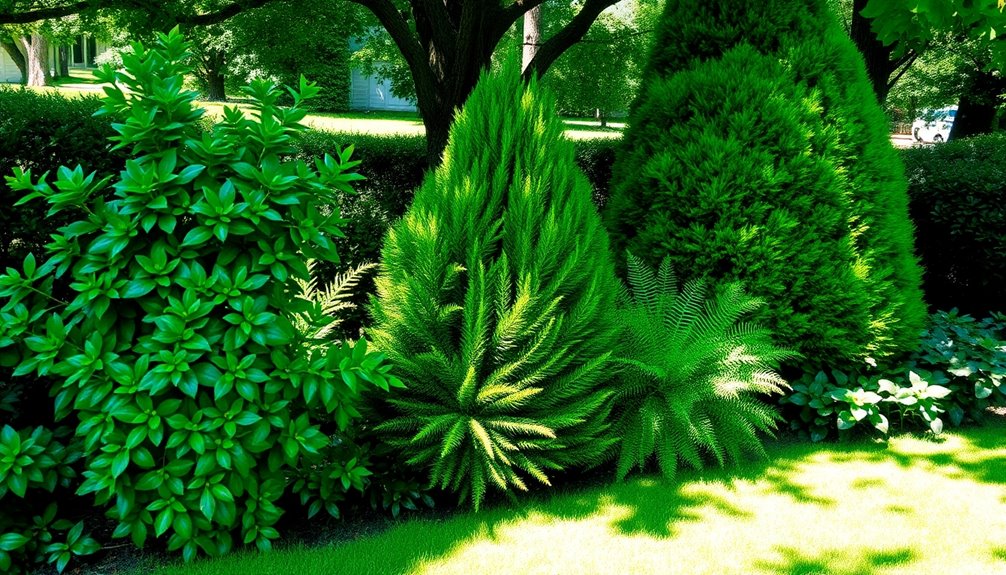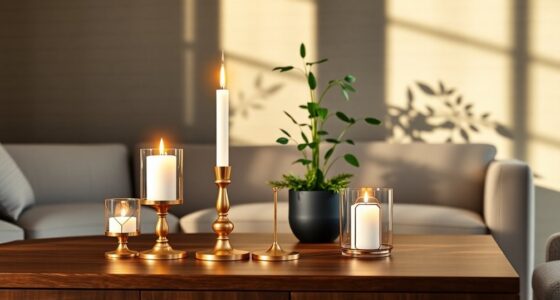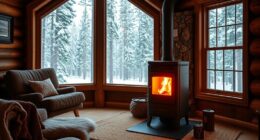In my ultimate guide to the six best evergreen plants for shade gardens, I've highlighted options that thrive in low light while adding beauty. You'll love the Skyrocket Juniper for its striking height and drought resistance. The fragrant Anise Forest Green brings a lovely scent, while the fast-growing Southern Red Cedar offers a lush backdrop. Don't overlook the dense Wintergreen Boxwood, perfect for structure, or the easy-to-care-for Evergreen Transplant Seedlings. Each of these plants enhances your garden year-round, and sticking around will reveal how to choose and care for them effectively!
Key Takeaways
- Skyrocket Juniper: This drought-resistant, low-maintenance tree reaches over 15 feet tall and thrives in shaded areas with an average rating of 4.0 stars.
- Anise Forest Green: Known for its fragrant foliage, this shade-loving plant requires regular watering and thrives in moist, well-drained soil.
- Southern Red Cedar: A fast-growing evergreen with minimal maintenance needs, it features feathery emerald foliage and tolerates salt, drought, and wind.
- Wintergreen Boxwood: Offers dense greenery year-round and is adaptable for various garden styles, though customer reviews vary on its value and quality.
- Evergreen Transplant Seedlings: A collection of Eastern white pine seedlings, praised for their successful growth, providing a great option for establishing greenery in shaded areas.
Skyrocket Juniper Live Trees (15 Pack)
If you're looking for a resilient and low-maintenance option for your shade garden, the Skyrocket Juniper Live Trees (15 Pack) could be just what you need. These upright columnar evergreens can reach over 15 feet tall, showcasing beautiful dusty blue-green foliage year-round. What I love most is their minimal care requirements; they don't need trimming, staking, or pruning. Plus, once established, they're drought-resistant and pest-resistant, making them perfect for busy gardeners. They thrive in various soil types and prefer full sun to part shade, fitting well in urban gardens or as foundation plantings. With an average rating of 4.0 stars, many customers share positive experiences about their growth and health, making these trees a solid choice for any garden.
Best For: Those seeking a low-maintenance, drought-resistant tree option for urban gardens or foundation plantings.
Pros:
- Maintenance-free with no need for trimming, staking, or pruning.
- Drought-resistant once established, making them suitable for busy gardeners.
- Year-round vibrant foliage that adds color to any landscape.
Cons:
- Some customers reported slow growth in certain conditions.
- Potential damage during shipping experienced by a few buyers.
- Limited adaptability to extreme cold in hardiness zones outside of 4-9.
Anise Forest Green Live Plants (Illicium Parviflorum)
The Anise Forest Green Live Plants (Illicium Parviflorum) stand out as an ideal choice for gardeners seeking a shade-loving evergreen that adds both beauty and fragrance to their landscape. I love their glossy, olive-green foliage, which resembles rhododendrons, and the delightful anise scent they emit. These small trees thrive in USDA Zones 7-10 and prefer moist, well-drained soil rich in organic matter. They're perfect for part to full shade, making them great for naturalizing in woodlands or using as hedges. Just remember to water regularly while they establish their roots. A bit of acid fertilizer in spring and occasional pruning will keep them healthy, ensuring they remain a lush, fragrant addition to your garden for years to come.
Best For: Gardeners looking for a shade-loving evergreen that adds beauty and fragrance to their landscape.
Pros:
- Fragrant anise scent enhances the garden atmosphere.
- Glossy, olive-green foliage provides year-round visual appeal.
- Versatile growth habits allow for naturalization in woodlands or use as hedges.
Cons:
- Mixed reviews on plant health upon arrival may affect initial satisfaction.
- Requires regular watering during establishment, which may be burdensome for some gardeners.
- Drought tolerance is limited; they prefer consistently moist soil.
Southern Red Cedar Tree – 10 Live Plants
For anyone looking to enhance their shade garden with a resilient and attractive evergreen, the Southern Red Cedar Tree (Juniperus virginiana Silicicola) stands out as an excellent choice. With its feathery emerald green foliage, this tree maintains its vibrant color all year round. I love how it's fast-growing and requires minimal maintenance, making it perfect for busy gardeners. It thrives in full to partial sun, and I've found that keeping the roots moist during the first year is essential for successful establishment. Whether you plant it along paths for added beauty or use it as a privacy hedge, its pyramidal shape is visually appealing. Just be aware that shipping experiences can vary, so check reviews before ordering.
Best For: Busy gardeners seeking a low-maintenance evergreen that provides year-round color and can serve as a privacy hedge or decorative feature.
Pros:
- Fast-growing and requires minimal maintenance.
- Tolerant of salt, drought, and wind, making it adaptable to various conditions.
- Attractive pyramidal shape and feathery emerald green foliage enhance landscape aesthetics.
Cons:
- Some customers report that the size of the plants may not meet expectations for the price.
- Shipping experiences can be inconsistent, with potential for damage during transit.
- Care must be taken to keep roots moist during the first year, requiring some initial attention.
Wintergreen Boxwood – 10 Live Quart Size Plants
Wintergreen Boxwood stands out as an ideal choice for anyone looking to enhance their shade garden with year-round greenery. These 10 live quart-size plants offer dense evergreen foliage that thrives in cooler temperatures, ensuring your garden stays vibrant even in winter. I love how adaptable they are; whether you prefer a formal layout or a more relaxed outdoor vibe, they fit perfectly. Plus, their malleable nature allows for easy shaping and pruning, making them perfect for topiary projects. Many customers rave about the well-packaged, healthy plants they received, although it's wise to double-check product descriptions to avoid any confusion over quantities. Overall, Wintergreen Boxwood can transform your garden into a lush, inviting space throughout the year.
Best For: Those seeking a versatile, low-maintenance plant for enhancing their gardens with year-round greenery and the potential for topiary artistry. These hardy plants not only provide a lush backdrop but also lend themselves beautifully to sculpting and shaping, making them ideal for both novice and experienced gardeners. When considering the best plants for garden topiary, options like boxwood and holly are popular choices due to their dense foliage and ability to withstand pruning. Embracing these plants can transform any outdoor space into a stunning display of creativity and natural beauty.
Pros:
- Dense evergreen foliage that maintains vibrant color throughout winter.
- Adaptable to various garden styles, from formal to casual landscapes.
- Malleable nature allows for easy shaping and pruning, ideal for creative gardening.
Cons:
- Mixed customer reviews regarding perceived value for money and quality.
- Potential confusion over the quantity of plants received based on product descriptions.
- Some customers reported dissatisfaction with the plant quality upon arrival.
Evergreen Transplant Seedlings 6 to 8 Tall Qty-22
Looking to add some greenery to your shade garden? I highly recommend the Evergreen Transplant Seedlings assortment, featuring 22 Eastern white pine seedlings, each standing 6 to 8 inches tall. These bareroot seedlings come wrapped in moist peat moss and plant gel, ensuring they stay hydrated during shipping. Plus, they're USDA APHIS compliant, so you can plant them worry-free.
With moderate watering needs, they fit perfectly into a variety of soil types. I appreciate that you can plant them year-round, and they'll provide year-round greenery. The feedback from other gardeners has been stellar, with a perfect rating for their ability to thrive after planting. Grab this bundle for a lush addition to your garden!
Best For: Gardeners looking to enhance their outdoor space with resilient evergreen trees that can thrive in various conditions.
Pros:
- USDA APHIS compliant, ensuring safe planting without regulatory concerns.
- Easy to plant year-round, providing flexibility for gardeners in different climates.
- Excellent customer ratings indicate high satisfaction and successful growth after planting.
Cons:
- No returns accepted on perishable items, limiting options if seedlings do not take.
- Dependent on local growing conditions, which may affect the success of the seedlings.
- Moderate watering needs, which may require attention during drier periods.
2-Pack Plant Covers for Outdoor Plants
Choosing the right plant covers can make all the difference for protecting your outdoor plants during harsh weather conditions. I've found the Garutom 2-Pack Plant Covers to be a fantastic option. Available in various sizes, these covers are made from lightweight, breathable polypropylene fabric that allows 85% of light to pass through while retaining heat. The drawstring design makes it easy to secure them around different plant sizes, and the zippers on larger covers add convenience. They protect against frost, rain, and even strong sunlight. Plus, with a solid customer rating of 4.4 stars, it's clear that many gardeners appreciate their durability and effectiveness. Trust me, these covers are a worthwhile investment for maintaining your garden's health year-round.
Best For: Gardeners looking for reliable winter protection for their outdoor plants against harsh weather conditions.
Pros:
- Durable material that withstands strong winds and protects against various weather elements.
- Lightweight and breathable design allows for easy application and helps maintain plant health.
- High customer satisfaction, evidenced by a solid rating of 4.4 stars and positive reviews highlighting its effectiveness.
Cons:
- Limited color options, as the product is only available in one color.
- May not fit larger plants without purchasing the bigger sizes, which might increase costs.
- Not waterproof, so additional protection may be necessary in heavy rain conditions.
Factors to Consider When Choosing Evergreen Plants for Shade Gardens: A Complete Guide

When I choose evergreen plants for my shade garden, I always consider a few key factors. Sunlight requirements, soil type preferences, and growth rates play an essential role in ensuring my plants thrive. Plus, I can't overlook maintenance needs and how much space each plant will need to grow.
Sunlight Requirements
Although selecting evergreen plants for shade gardens may seem straightforward, understanding their sunlight requirements is vital for a thriving landscape. Most evergreens thrive in part shade to full shade, but I've found that some can tolerate full sun if you keep the soil adequately moist. It's important to take this into account when choosing your plants.
For instance, I've noticed that Illicium parviflorum prefers well-drained soils rich in organic matter to support robust growth. Sunlight exposure can dramatically affect growth habits; those in deeper shade might grow slower and become leggier compared to their counterparts basking in more light. This is something I keep in mind when planning my garden layout.
Also, don't forget about USDA Hardiness Zones. Different species have varying tolerances to temperature and light conditions, so knowing your zone can help narrow your choices. Finally, monitoring moisture levels is key in shaded areas, as the lack of direct sunlight can lead to cooler and damper conditions. Regular watering checks are a must to guarantee your evergreens stay healthy and vibrant.
Soil Type Preferences
To guarantee your evergreen plants flourish in a shade garden, it is vital to take into account their soil type preferences. Most evergreens thrive in well-drained soil rich in organic matter, which supports their growth and root development. While many shade-loving varieties, like the Anise Forest Green, do well in moist, clay soils, some can adapt to a broader range of soil types as long as there's proper drainage.
During the first growing season, I've found that regular watering helps establish a deep root system, allowing the plants to acclimate better to their soil conditions. Don't forget about soil pH—acid-loving evergreens often appreciate a little help from acid fertilizers to keep their environment just right.
Another tip I've learned is the importance of mulching around your shade garden evergreens. Mulch helps retain soil moisture and regulate temperature, both vital for the overall health and growth of your plants. By considering these soil type preferences, you'll set your evergreen plants up for success in your shade garden. Happy planting!
Growth Rate Considerations
Understanding the growth rates of evergreen plants is fundamental for creating a successful shade garden. I've found that different species can vary greatly in how quickly they reach maturity. For instance, the Skyrocket Juniper can soar to over 15 feet in just 10-15 years, while others take their time to establish.
If you're looking for quick coverage or privacy, fast-growing evergreens like the Southern Red Cedar are a great option. They provide immediate results, making them ideal for urgent landscaping needs. On the flip side, shade-loving evergreens such as the Anise Forest Green may grow slower but thrive beautifully in low-light conditions, perfectly suited for shaded areas.
It's essential to evaluate initial growth rates because some evergreens need extra care during their first growing season. Regular watering is critical for these plants to develop a deep root system, ensuring they grow most effectively. Additionally, keep in mind that environmental factors like soil quality and moisture availability can greatly influence growth rates. So, take time to assess these aspects before making your selection, and you'll set your shade garden up for success!
Maintenance Needs
When selecting evergreen plants for your shade garden, maintenance needs play a considerable role in ensuring your landscape thrives. I've found that shade-loving evergreens typically require less upkeep compared to their sun-loving counterparts. They thrive in moist, well-drained soils rich in organic matter, making them easier to care for.
During the first growing season, many of these plants, like Illicium parviflorum, appreciate regular watering to establish a deep root system. Once they're settled, they become more drought-tolerant, which is a relief. I've also noticed that pruning is generally minimal for these evergreens. A little shaping after flowering helps maintain their form without needing frequent intervention.
Mulching around your plants can be a game-changer. It conserves soil moisture, keeps roots cool, and suppresses weeds, considerably cutting down on maintenance tasks. As for fertilization, it varies among species. Some may need an acid fertilizer in early spring, while others thrive in nutrient-rich environments without extra feeding. Understanding these maintenance needs will help you choose the right evergreen plants for your shade garden, ensuring a healthy and vibrant landscape.
Size and Spacing
Choosing the right size and spacing for evergreen plants in your shade garden can make a world of difference in the overall aesthetic and health of your landscape. First, consider the mature size of the plants. Some evergreens can grow over 15 feet tall, so I always guarantee I have enough vertical space. Then, I pay attention to spacing; larger evergreens should generally be planted at least 4 to 6 feet apart. This allows for their expansive growth and guarantees good air circulation.
Next, the growth rate is vital. Some evergreens may shoot up nearly a foot or more each year, which will quickly fill your garden. I also consider their spread, as certain varieties can form colonies that affect the garden's layout. Finally, don't overlook the root system. Trees with deep roots need more underground space, which can impact nearby plants and overall garden health. By keeping these factors in mind, I create a well-balanced shade garden that not only looks great but thrives throughout the seasons.
Seasonal Interest
After considering size and spacing, it's time to think about how evergreen plants can bring seasonal interest to your shade garden. One of the biggest advantages of evergreens is their ability to maintain vibrant foliage throughout the year. While deciduous plants may leave your garden bare in winter, evergreens like Anise Forest Green keep their glossy leaves, adding texture and depth to shaded areas.
I love how certain evergreens, such as Illicium parviflorum, not only enhance the visual appeal but also provide aromatic interest with their fragrant foliage. This scent can enrich your sensory experience, transforming your garden into a delightful retreat.
It's essential to choose evergreens that adapt well to shade conditions. They'll create striking contrasts against the muted winter landscape, ensuring your garden remains dynamic and inviting, even when other plants are dormant. By selecting the right evergreen plants, you can enjoy a beautiful shade garden that offers year-round charm and interest. So, let's explore how to choose the best evergreen plants to keep your garden lively through every season!
Frequently Asked Questions
How Do I Care for Shade-Loving Evergreen Plants?
Caring for shade-loving evergreen plants is easier than you might think! I always guarantee they get the right amount of water, keeping the soil consistently moist but not soggy. I also check for pests regularly and apply organic treatments if needed. Fertilizing in early spring helps them thrive, too. Finally, I prune any dead or damaged branches to maintain their shape and health. It's rewarding to see them flourish in my garden!
Can Evergreen Plants Thrive in Heavy Shade?
Absolutely, evergreen plants can thrive in heavy shade! I've found that certain varieties, like ferns and holly, really flourish without much sunlight. They adapt well, often growing lush and vibrant in those dim areas. When I select plants, I always check their light requirements to guarantee they'll be happy in my garden. With the right care and attention, you can create a beautiful, green haven even in the shadiest spots!
What Are the Best Companion Plants for Evergreens in Shade?
When I planted my emerald green boxwoods in a shady corner, I realized they needed companions to truly shine. Hostas are a fantastic choice; their lush foliage complements evergreens beautifully while thriving in low light. I also love adding ferns for a delicate touch. These plants not only enhance the visual appeal but also create a vibrant ecosystem in the shade, making my garden feel alive and inviting.
How Often Should I Water Shade Evergreen Plants?
When it comes to watering shade evergreen plants, I find consistency is key. Typically, I water them once a week, but I adjust based on weather conditions. If it's particularly hot or dry, I might increase it to twice a week. I always check the soil moisture first; if it feels damp an inch down, I wait a bit longer. It's all about keeping the balance without overwatering—plants appreciate that!
When Is the Best Time to Plant Evergreen Shrubs in Shade?
When I think about the best time to plant evergreen shrubs in shade, I usually aim for early spring or fall. During these seasons, the weather's milder, and the soil's still warm enough to encourage root growth. I've found that planting when temperatures are moderate helps the shrubs establish themselves without the stress of extreme heat or cold. Just make sure to prepare the soil well before planting to give those shrubs a great start!
Conclusion
To sum up, filling your shade garden with evergreen plants not only adds beauty but also brings life to those dim corners. With options like the Skyrocket Juniper and Anise Forest Green, you're sure to find the perfect fit. Just remember, choosing the right plants is like selecting the right notes in a symphony—each contributes to a harmonious, thriving landscape. So grab your gardening gloves and let your shade garden shine year-round!
















